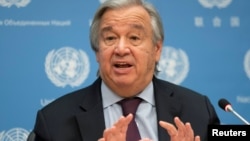ໃນຂະນະທີ່ໂຣກລະບາດໄດ້ເລີ້ມແຜ່ລາມອອກໄປໃນຕົ້ນປີ 2020 ນັ້ນ, ທ່ານແອນໂຕນິໂອ ກູເຕເຣສ (Antonio Guterres), ເລຂາທິການໃຫຍ່ອົງການສະຫະປະຊາຊາດໄດ້ຂໍຮ້ອງ ໃຫ້ມີການຢຸດຍິງຢູ່ທົ່ວໂລກ, ໂດຍກ່າວວ່າໂລກຈຳເປັນຕ້ອງໄດ້ສຸມໃສ່ "ການຕໍ່ສູ້ທີ່ແທ້ຈິງ" ຕ້ານກັບໄວຣັສໂຄໂຣນາ.
ທ່ານກ່າວວ່າ "ການບໍ່ມີສຽງປືນ ບໍ່ພຽງແຕ່ຈະເປັນການສະໜັບສະໜູນການຕໍ່ສູ້ຕ້ານກັບພະຍາດໂຄວິດ-19 ເທົ່ານັ້ນ, ແຕ່ມັນຍັງຈະສ້າງໂອກາດໃນການຊ່ວຍ ເຫລືອກອບກູ້ຊີວິດໄວ້, ເປີດປະຕູທາງການທູດ, ແລະນຳຄວາມຫວັງມາສູ່ປະຊາ ຊົນທີ່ປະສົບກັບຄວາມຫຍຸ້ງຍາກຢູ່ເຂດທີ່ມີການຂັດແຍ້ງກັນ, ຜູ້ທີ່ມີຄວາມສ່ຽງເປັນການສະເພາະຫລາຍທີ່ສຸດຕໍ່ໂຣກລະບາດດັ່ງກ່າວນັ້ນໄດ້ອີກ."
ກູດເຕເຣສ ກ່າວຕໍ່ໄປວ່າ “ໂລກຂອງພວກເຮົາປະເຊີນກັບສັດຕູໂຕດຽວກັນຄື: ໂຄວິດ-19. ໄວຣັສດັ່ງກ່າວບໍ່ສົນໃຈວ່າຈະເປັນຄົນສັນຊາດຫຼືຊົນເຜົ່າໃດ, ບໍ່ນັບ ຖື ຫລືນັບຖືສາສະໜາ. ມັນໂຈມຕີທຸກຄົນຢ່າງບໍ່ຢຸດຢັ້ງ. ໃນຂະນະດຽວກັນ, ການປະທະກັນດ້ວຍກຳລັງອາວຸດກໍ່ເກີດຂຶ້ນຢູ່ທົ່ວໂລກ.”
ເກືອບຮອດ 200 ປະເທດໄດ້ຮັບຮອງເອົາຄຳຮ້ອງຂໍຢຸດຍິງຂອງທ່ານ- ສະພາຄວາມໝັ້ນຄົງອົງການສະຫະປະຊາຊາດ, ອົງການຈັດຕັ້ງຫຼາຍຝ່າຍໃນພາກພື້ນ ແລະບັນດາກຸ່ມສັງຄົມ-ພົນລະເຮືອນກໍຮ້ອງຂໍໃຫ້ຢຸດຍິງເຊັ່ນກັນ. ແຕ່ຄຳຮ້ອງຂໍໂດຍລວມ ແມ່ນຕົກໄປຢູ່ໃນຫູຂອງຄົນທີ່ບໍ່ຟັງ ຫຍັງເລີຍ.
ການຂັດແຍ້ງກັນສືບຕໍ່ເກີດຂຶ້ນໃນທົ່ວໂລກ - ບາງບ່ອນແມ່ນການສືບຕໍ່ເຮັດສົງຄາມກ່ອນເກີດໂຣກລະບາດ; ບ່ອນອື່ນໆ ແມ່ນເກີດຂຶ້ນຍ້ອນມີການຂັດແຍ່ງກັນທີ່ມີມາກ່ອນການລະບາດພຸ້ນ.
ທ່ານເດວິດ ມີລິແບນ (David Miliband), ອະດີດລັດຖະມົນຕີກະຊວງການຕ່າງປະເທດອັງກິດ ແລະປັດຈຸບັນເປັນຫົວໜ້າຄະນະກຳມະການກູ້ໄພສາກົນ, ໄດ້ຈົ່ມໃນເດືອນທັນວານີ້ວ່າ ບັນດາປະເທດມະຫາອຳນາດ ບໍ່ໄດ້ດໍາເນີນການຢ່າງພຽງພໍ ທີ່ຈະພະຍາຍາມໃຫ້ມີຂໍ້ຕົກລົງສັນຕິພາບແລະ ຢຸດຍິງ.
ທ່ານກ່າວວ່າ “ໂລກຍັງສືບຕໍ່ຫັນໜ້າໜີ ໃນຂະນະທີ່ພວກເຮົາດຳລົງຊີວິດຜ່ານຍຸກທີ່ບໍ່ມີການເອົາຜິດໄດ້ ໂດຍທີ່ລັດຖະບານ, ຜູ້ຜະເດັດການ, ນາຍພົນແລະ ກຸ່ມຕິດອາວຸດທັງຫລາຍບໍ່ສົນໃຈຕໍ່ກົດໝາຍສົງຄາມ, ຍ້ອນຮູ້ວ່າ ພວກເຂົາເຈົ້າບໍ່ຕ້ອງໄດ້ຮັບຜິດຊອບຕໍ່ການກະທຳຜິດຂອງຕົນ. ວິກິດການທີ່ຮ້າຍແຮງ ແລະທໍາຄວາມເສຍຫາຍຫລາຍທີ່ສຸດ ເຊັ່ນຢູ່ອັຟການິສຖານ, ຊີເຣຍ ແລະສາທາລະນະລັດ ປະຊາທິປະໄຕຄອງໂກ ຫລື DRC ໄດ້ມີການແຜ່ລາມໄປເປັນເວລາຫຼາຍ ປີ ຫລືແມ່ນກະທັ້ງໄດ້ຫລາຍທົດສະວັດແລ້ວ, ແລະຄາດວ່າຈະຮ້າຍແຮງຂຶ້ນກວ່າເກົ່າໃນປີ 2021 ນີ້.”
ທ່ານໄດ້ກ່າວແບບໂສກເສົ້າຕໍ່ແນວໂນ້ມທີ່ເພີ່ມຂຶ້ນຂອງພວກນັກຕໍ່ສູ້ທີ່ບໍ່ສົນໃຈຕໍ່ກົດໝາຍສົງຄາມສາກົນ ທີ່ແນໃສ່ສະກັດກັ້ນການຂັດແຍ້ງກັນ ແລະຂັດຂວາງການຍິງທີ່ແນເປົ້າໝາຍໃສ່ພົນລະເຮືອນນັ້ນ.
ອ່ານຂ່າວນີ້ເພີ້ມເປັນພາສາອັງກິດຂ້າງລຸ່ມນີ້
As the pandemic started to unfold early in 2020, U.N. Secretary-General Antonio Guterres made a plea for a global cease-fire, saying the world needed to focus on “the true fight” against the coronavirus.
“Silencing the guns will not only support the fight against COVID-19, but also create opportunities for life-saving aid, open windows for diplomacy, and bring hope to people suffering in conflict zones who are particularly vulnerable to the pandemic,” he said.
“Our world faces a common enemy: COVID-19. The virus does not care about nationality or ethnicity, faction or faith. It attacks all, relentlessly. Meanwhile, armed conflict rages on around the world,” Guterres added.
Nearly 200 countries endorsed his cease-fire plea – so, too, did the U.N. Security Council, regional multilateral organizations and civil-society groups. But the plea overall fell on deaf ears.
Conflicts continued to rage across the world – some were the continuation of pre-pandemic wars; others, flare-ups of pre-existing disputes.
David Miliband, the former British foreign minister and now head of the International Rescue Committee, complained in December that major powers had not done enough to try to engineer peace deals and truces.
“The world continues to look away as we live through the age of impunity in which governments, dictators, generals and militias ignore the laws of war, knowing that they will never be held accountable for their abuses. The most severe and devastating crises like Afghanistan, Syria and DRC have been reeling for years or even decades, and are expected to become even worse in 2021,” he said.
He lamented the increasing tendency of combatants to ignore the international laws of war aimed at tempering conflict and deterring the targeting of civilians.
The list of conflicts makes for sorry reading. In Central Asia, full-scale conflict reignited when Azerbaijan, backed by Turkey, launched an offensive to retake the mountainous enclave of Nagorno-Karabakh. It’s an internationally recognized part of Azerbaijan but has been controlled by ethnic Armenians since a war in the 1990s. A militarily ill-prepared Armenia threw in the towel, accepting a cease-fire brokered largely by Moscow in order to avoid losing all of the enclave. The deal left the Azerbaijanis rewarded with territory they recaptured.
Few observers believe this conflict is over for good – Armenians feel humiliated, and military veterans have vowed revenge for the defeat on the battlefield.
The bitter war between a Saudi-led coalition and Houthi rebels in Yemen, which began in 2015, persisted throughout 2020, despite a unilateral cease-fire declared by Riyadh in April. The Saudi-led coalition conducted dozens of airstrikes within days of announcing the cease-fire, and on July 2 their jets redoubled airstrikes on several Yemeni provinces. The Saudis said it was in retaliation for ballistic missile strikes and armed-drone attacks by the Houthis, who are backed by Iran.
Since September, both sides have intensified attacks.
The armed conflict in Ukraine's Donbass region, which began after the 2014 Maidan uprising and was prompted by protests by Russia-backed separatists, has seen 29 cease-fires since the war started. None stopped the violence, although the 29th, announced in July, resulted in no Ukrainian combat losses for a month. Attacks have decreased, but there is no resolution in sight to the armed standoff.
In November 2020, fighting erupted in the Tigray region of Ethiopia between the Tigray People's Liberation Front and an alliance of Ethiopian and Eritrean defense forces. The U.N. says the conflict is “exceedingly worrying and volatile.” Tigray is now isolated from the world, with food and medicine in short supply for the region’s 6 million people.
Altogether in 2020, there were four major conflicts – those that have seen more than 10,000 combat-related deaths in the current or past year. Fourteen ongoing conflicts, including civil wars and insurgencies, which have seen fewer than 10,000 deaths in the past or current year. And 22 so-called minor conflicts, including drug wars, which saw less than a thousand combat-related casualties in the past or current year.
Analysts say 2020 saw a continuation of an increasing trend with the world’s wars – they are becoming more complex. One-fifth of conflicts today involve more than 10 actors, and two-thirds involve at least three parties, according to the International Rescue Committee. “The global rise in the number of conflicts is driven by a 600% increase in internationalized civil conflicts – those crises involving a foreign actor – since 1990,” the agency noted in a gloomy round-up for 2020.
And the IRC also warned: “The influence of nonstate armed groups – including criminal gangs, communal militias, militant groups and more – over crisis situations is growing. From Afghanistan to Colombia to Mozambique, nonstate armed actors have significant influence.”
Aid agencies say the more complex wars become, the harder it is to deliver humanitarian assistance, worsening the plight of civilian populations.




